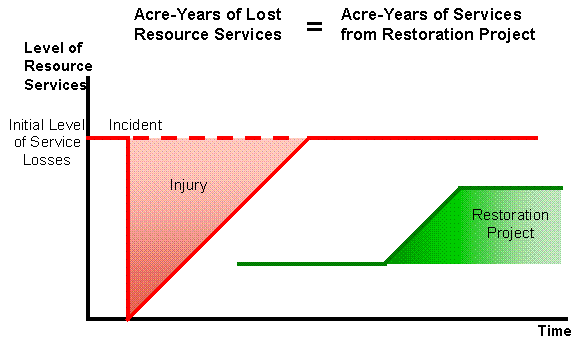by Steve Hampton and Matt Zafonte
Updated August, 2005

When an oil spill or other pollution event occurs, the public may be entitled to compensatory restoration. This does not refer to attempts to clean up the impacted site and restore it to its pre-spill condition; that is primary restoration. Compensatory restoration is additional restoration that compensates the public for the interim lost ecological services between the time of the incident and full recovery to pre-spill conditions.
While there are a variety of economic methods that may be used to calculate resource damages, Resource Equivalency Analysis (REA), also known as Habitat Equivalency Analysis (HEA) is the most common method used in NRDA cases nationwide. This method was developed in the early 1990s and became the recommended approach in the Oil Pollution Act of 1990 (OPA 90) regulations promulgated by NOAA in 1996. Since then, REA has been endorsed by the courts on two occasions. Here, we provide a brief synopsis of that method, as well as links and references to more detailed descriptions and articles about REA.
REA, we first seek to quantify the injury in terms of degree (% of baseline injured), duration (years until recovery), and size (# of acres, stream miles, birds, etc.). A trajectory estimating the recovery to baseline is also estimated. The injury may be described in terms of lost acre-years or stream mile-years or bird-years of lost ecological services. We then seek to quantify the benefits of a restoration project in similar terms: degree of benefit (e.g., % services per unit area), duration of the project, and trajectory of the benefits over time. With this information, we "scale" the size of the project until the benefit of the project is equal to the injury. The final step is to cost out the project. This cost becomes the measure of damages.
References
- Dunford, R.W., T.C. Ginn, and W.H. Desvousges. 2004. The use of habitat equivalency analysis in natural resource damage assessments. Ecological Economics 48: 49-70.
- Flores, N.E., and J. Thacher. 2002. Money, who needs it? Natural resource damage assessment. Contemporary Economic Policy 20(2): 171-178.
- Hampton, S. and M. Zafonte. 2004. Discounting and uncertainty in natural resource damage assessments. Poster. Fourth SETAC World Congress, November 14-18, 2004, Portland, OR
- Hampton, S. and M. Zafonte. 2003. Calculating compensatory restoration in natural resource damage assessment: Recent experience in California. Proceedings of the California World Ocean ’02 Conference, October 2002, Santa Barbara, CA PAPER AVAILABLE HERE
- Helton, D. and T. Penn. 1999. Putting response and natural resource damage costs in perspective. Proceedings of the 1999 International Oil Spill Conference.
- Jones, C.A. and K.A. Pease. 1997. Restoration-based compensation measures in natural resource liability statutes. Contemporary Economic Policy 15: 111-122.
- King, D.M. 1997. Comparing ecosystem services and values with illustrations for performing Habitat Equivalency Analysis. Prepared for NOAA. Silver Spring, MD. PAPER AVAILABLE ONLINE
- Mazzotta, M.J., J.J. Opaluch, and T.A. Grigalunas. 1994. Natural resource damage assessment: The role of resource restoration. Natural Resources Journal 34: 153-178.
- NOAA. 1995. Habitat Equivalency Analsyis: An Overview. Policy and Technical Paper Series, No. 95-1, (Revised 2000 and 2006).
- NOAA. 1999. Discounting and the treatment of uncertainty in natural resource damage assessment. Technical Paper 99-1.
- Penn, T., and T. Tomasi. 2002. Calculating resource restoration for an oil discharge in Lake Barre, Louisiana, USA. Enivornmental Management 29(5): 691-702. PAPER AVAILABLE ONLINE
- Sperduto, M.B., S.P. Powers, and M. Donlan. 2003. Scaling restoration to achieve quantitative enhancement of loon, seaduck, and other seabird populations. Marine Ecology Progress Series, 264:221-232.
- United States v. Fisher, 977 F. Supp 1193 (D.D. Fla 1997)
- United States v. Great Lakes Dredge and Dock Co., No. 97-02510-CIV-EBD, 1999.
- U.S. Dist. LEXIS 17612 (S.D. Fla. Sept. 27, 1999), aff’d, 259 F.3d 1300, 1305-06 (11th Cir. 2001).
- Unsworth, R.E., and R.C. Bishop. 1994. Assessing natural resource damages using environmental annuities. Ecological Economics 11: 35-41.
- Zafonte, M. and S. Hampton. 2007. Exploring welfare implications of resource equivalency analysis in natural resource damage assessments. Ecological Economics 61: 134-145
- Zafonte, M. and S. Hampton. 2005. Lost bird-years: Quantifying bird injuries in natural resource damage assessments for oil spills, Proceedings of the 2005 International Oil Spill Conference, May 15-19, 2005, Miami, FL.